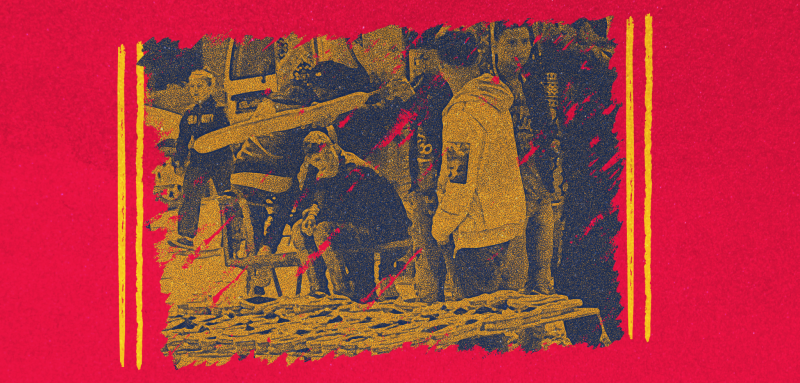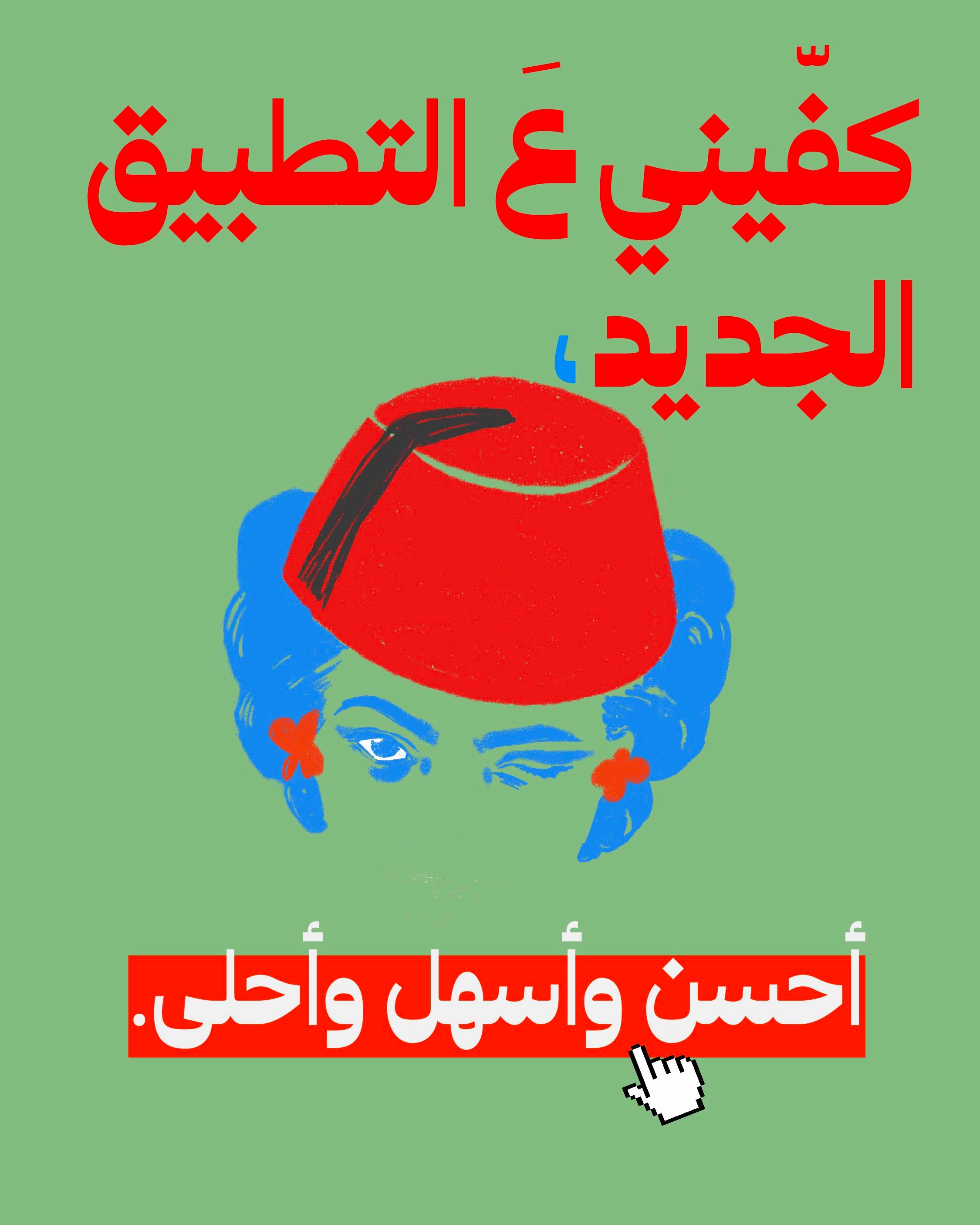Young Ramzi (pseudonym) undergoes a daily bitter struggle in the alleys of the Medina of Tunis (an old neighborhood in the capital), while dragging a cart full of clothes to take to his employer, who rents a clothing store in the markets of the old neighborhood.
Ramzi, 16, tells Raseef22, “I dropped out of school early because of family circumstances that made it impossible for me to complete my studies at the age of 14, and from that time, my journey began to find work that offers any kind of pay. The only important thing is that it’d be a job that would allow me to support my family and myself.”
This minor’s situation is not an exceptional one. In Tunisia, the employment of minors is flourishing at a pace that is causing great concern and apprehension among the authorities, who seem unable to curb this phenomenon, despite the laws they ratified in the years following the revolution to put an end to it.
The issue of school dropouts is exacerbating this phenomenon. On September 12, Education Minister Fathi al-Salouti revealed that 69,000 students had dropped out of school in 2021 alone, noting in statements to the local radio station “IFM”, that “this number is very large, as it is equivalent to three hundred students a day leaving school, of whom 100 are exposed to all types of risks.”
Professions that are full of troubles
Working in the Medina of Tunis is a daunting task, as it becomes crowded with passers-by and shoppers every day, especially in the summer, which this year saw record temperatures above 40 degrees. This doubles the challenge for Ramzi, who can barely speak to us while drenched in sweat.
He says, “I come every day from ‘Ahwaz’ (the outskirts) of the state (province) of Ariana. I take the metro until I reach the Jumhuriya station in the center of the country and then continue the remaining distance on foot to start another arduous journey from work, in which I transport clothes from a store that looks like a ‘magaza’ (storage warehouse) where the supplier places his goods and we bring them here to be put up for sale, and I stay here to sell with him for the remainder of the time,” he says.
“I left school due to family circumstances at the age of 14. From that time, my journey began to find work that offers any kind of pay. The only important thing is that it’d be a job that would allow me to support my family and myself”
It is noteworthy that the employment of minors in Tunisia isn’t only limited to the capital Tunis or nearby cities, but also includes the countryside and various sectors, such as agriculture and even beggary.
In one of the rural areas of the northwestern province of El Kef, 17-year-old Ahmed takes daily care of the livestock of a wealthy man in the region whose name he was reluctant to give.
Ahmed tells Raseef22, “From a young age, I used to look after my father’s livestock on holidays, until I lagged behind in my studies, which hastened me having to leave school and look for work.”
He continues, “Unemployment in the country is worsening even for adults who hold university degrees, let alone a child like me who has not passed the primary level of education. So I resorted to looking for another job that didn’t require a high level of education, that I found in professions like construction, which I do not even have physical qualifications to take on, so I ended up caring for livestock for one of our neighbors who has an important holding of livestock in the region.”
“From a young age, I used to look after my father’s livestock on holidays, until I lagged behind in my studies, which hastened me having to leave school and look for work”
The Ministry of Women, Family, Children, and Seniors (MFFES), said in a report issued on the 12th of June, that the manifestations of child exploitation are represented in their employment and labor at an early age, their exploitation in human trafficking, their exploitation sexually, and other practices that it called for the containment of.
In the report, the ministry revealed that in the year 2021, it received 392 notices of children being exposed to exploitation and begging, which is an alarming number, but it may not reflect the true reality of this phenomenon, as this number only includes notices (complaints) submitted by citizens.
While speaking to Raseef22, the General Delegate for Child Protection at the Ministry of Women, Family, and Children (MFFES), Mehyar Hammadi, stressed that “these figures remain very limited given the reality of things and the fact remains that when a child is exploited on holidays and the like, it is normal for some families.”
School dropouts
The dilemma of employing minors in Tunisia cannot be separated from the deterioration of the level of education in the country and the growing number of school dropouts, which poses another challenge to the existing political authority.
Sociologist Moaz Bin Naseer attributes the growing phenomenon of child labor and employing minors to the increasing number of children who drop out of education due to the decline in the role of state institutions in framing young people and youth development.
Bin Naseer goes on to say to Raseef22, “In addition to this, one of the reasons is the poor social and economic level of Tunisian families due to the weak purchasing power and the inability to meet increasing expenditures, which led many of them to make their children work. We must acknowledge that the prevalence of poverty and illiteracy among the parents in some societies, the existence of the need for the child to work to obtain an income that helps secure the needs of the family, and the difficult social and economic conditions of families are among the direct causes of the growth of this phenomenon.”
Officials and analysts agree that there is a lack of awareness among Tunisian families of the serious repercussions on children who are vulnerable to child labor and employment at an early age as well as exploitation of all kinds.
Bin Naseer further explains that, “There is a lack of awareness among the parents of the negative and harmful effects of child labour at an early age, compounded by the lack of basic social skills and the high unemployment rate among adult parents.”
He finally asserts that, “The spread of some cultural values that encourage child labor in some societies may serve to increase this phenomenon, as well as the financial problems and accumulated debts that some families suffer from, which may push children to work to pay them off. There is also an important factor, which is the increase in migration from the countryside to the cities, which was the cause of developing the concept of employing minors.”
Legal incapacity...
When Tunisia’s Ministry of Women, Family and Children released its latest figures, it triggered a long-standing and ever-renewing debate about the mechanisms and ways to put an end to such phenomena: Does it lie in creating new laws?
These questions seem self-evident, as Tunisia has enacted several legislations and laws aimed at addressing this phenomenon and accommodating children and the youth, but there is a wide gap between laws and reality.
According to Mehyar Hammadi, Tunisia has put in place sufficient texts to address the phenomenon, whether by ratifying international texts or by national legislation from the constitution and domestic laws.
Neither the green figures nor the regional administrations for child protection in Tunisia have led to the reduction of the employment of minors and the prevention of child exploitation. This is at a time when public schools are losing their luster
Hammadi highlighted that, “The Tunisian legislation prohibits the employment of children under the age of eighteen, and specifies the hazardous occupations that the child should not be present in, as well as the dangerous places where the child should not be involved, such as sanitation and sewerage work, domestic work. and others.”
Hammadi explained that there is a wide gap between the texts, legislations, and the reality that Tunisia is witnessing in several regions regarding the phenomenon of employing minors, stressing that “cases of economic exploitation and seeing children at extraction stations selling smuggled goods late at night, have become a daily occurrence in the lives of Tunisians.”
The Tunisian parliament has passed several laws dealing with the issue, such as the anti-human trafficking law enacted on August 3, 2016, which stipulates that “the economic or sexual exploitation of children is prohibited on the occasion of their employment,” without further clarification, leaving the door wide open to various legal interpretations.
The Law on (the elimination of) Violence against Women, which was passed by parliament on August 11, 2017, also stipulates that “anyone who intentionally employs children as domestic workers, directly or indirectly, shall be punished with imprisonment from 3 to 6 months and a fine of 2,000 to 5,000 dinars. The same punishment mentioned in the preceding paragraph shall apply to anyone who mediates to employ children as domestic workers.”
However, this phenomenon continues to grow, putting the authority under additional pressure. Neither the green figures it has drawn up nor the regional administrations for child protection have led to the reduction of the phenomenon and the prevention of child exploitation. This is at a time when public schools are losing their luster, making the numbers of children vulnerable to economic exploitation, likely to rise in the coming period.
رصيف22 منظمة غير ربحية. الأموال التي نجمعها من ناس رصيف، والتمويل المؤسسي، يذهبان مباشرةً إلى دعم عملنا الصحافي. نحن لا نحصل على تمويل من الشركات الكبرى، أو تمويل سياسي، ولا ننشر محتوى مدفوعاً.
لدعم صحافتنا المعنية بالشأن العام أولاً، ولتبقى صفحاتنا متاحةً لكل القرّاء، انقر هنا.


